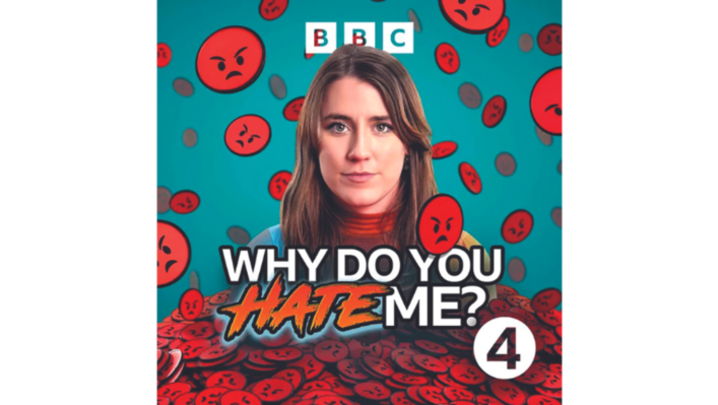Simon Bucks follows Marianna Spring on a disturbing trek through the mires and warrens of Conspiracyland
“Disinformation Correspondent” is surely a top contender in the Orwellian job title stakes. The BBC’s Marianna Spring has “and Social Media” tagged on, but that’s not her focus. Social media, as she explains in this disturbing book, is just the vehicle for spreading unfounded scare stories, half-baked pseudoscience, racist bigotry and unadulterated hate.
Spring, winner of the RTS Television Journalism Awards 2023 Innovation prize, has delved deep in the cesspool of disinformation and unearthed some of the mad, bad and sad characters who inhabit the cyber underground.
Among the Trolls – My Journey Through Conspiracyland is an unashamed spin-off of Spring’s broadcast journalism, from podcasts to Panorama, where she is nicknamed “Miss Information”. Much of her narrative, and many of the people she meets, will already be familiar to regular BBC listeners and viewers.
Her title is a deliberate reference to Alice’s Adventures in Wonderland. Conspiracyland, she explains, is a topsy-turvy parallel universe reached by falling down a virtual rabbit hole. As in Alice, any initially benign impressions of its inhabitants disguise an underlying sinister darkness.
Spring cleverly contrasts the superficially mundane aspects of the trolls with their outlandish notions. Among the more infamous is Kate Shemirani, a glamorous trained nurse and mother of grown-up children, living with her chihuahuas and cats, serving juice and fruit. She is also one of the most extreme conspiracy theorists on Covid-19, dubbing it a “scamdemic”; its symptoms, she thinks, are caused by 5G phone radiation.
Shemirani subscribes to “Nuremberg 2.0”, a widely held belief among conspiracists that doctors and others, including journalists, should be tried for “crimes against humanity” for concocting the pandemic and the Covid vaccines and, if convicted, should be hanged.
Covid and vaccines, more generally, are the two biggest preoccupations of conspiracists. While Spring acknowledges that there is a legitimate debate about how “for-profit” pharmaceutical companies make their money, she highlights a particularly tragic case to illustrate the harm that trolls can cause. Gary, a committed non-believer in Covid and an anti-vaxxer, became so convinced that mainstream media and politicians were lying that he eschewed medical help when he caught the disease and eventually died.
A central theme of Spring’s book, and, arguably, one that should most alarm readers of Television, is the serious mistrust of mainstream media that suffuses the continent of Conspiracyland.
Conspiracists, she contends, feel betrayed by the media. At rallies, journalists are often described as “the enemy of the people” and the BBC as “Satan’s advocates” for disseminating what are claimed to be false stories. “A highly paid Nato and BBC propagandist” is one of the more printable charges aimed at Spring.
The conspiracists’ suspicion of the BBC and other mainstream media was behind the launch, during the pandemic, of their own free newspaper, The Light, which is handed out by volunteers in many towns and cities. It argues that the pandemic was a hoax. Its articles are a ragbag of misleading claims about vaccines, the financial system and climate change. It’s not without influence: its print run is 100,000, and it reaches 18,000 subscribers on Telegram, the social media platform of choice for conspiracists because of its relaxed attitude to moderation.
Spring goes in search of The Light’s editor, Darren Nesbitt (alias Smith), eventually persuading him to do an on-camera interview. Nesbitt will only answer her questions if she will answer his alternating questions.
Spring describes this bizarre television duel, each facing the other’s cameras and taking it in turns to ask questions. The same technique has been adopted by others in the public eye, such as Elon Musk and Andrew Tate.
Spring – rightly – agrees; she is happy to answer questions about her journalism. Nesbitt’s answers, however, illustrate how easily conspiracists can slip from respectable scepticism to bonkers, evidence-free theories.
“We don’t have to accept what the BBC tells us… what the official narrative is,” Nesbitt tells Spring. For BBC, you could read any mainstream media or government message – and few would argue with that. Challenge and counter challenge are the stuff of intellectual debate.
But when Spring presents him with evidence to contradict his theories, he brushes off these inconvenient facts, adamant that, if he says something isn’t true, it isn’t true. “That’s how Conspiracyland works,” Spring writes. “You can build a whole world where objective truth is irrelevant.”
Given her job, it’s hardly surprising that Spring receives most of the online abuse sent to BBC staff. She even had a stalker waiting for her outside New Broadcasting House and worries that the trolls who routinely send her death threats might one day be tipped into actually trying to kill her.
Some disobliging posts by Elon Musk on X/Twitter after she investigated him for Panorama prompted an avalanche of hate messages, including videos of hangings and of a woman tied up at gunpoint. Twitter insiders told her that the job cuts imposed by Musk meant the platform could no longer prevent trolling. Although the company maintained that protecting users was a priority, Spring notes that its press office responded to information requests with poo emojis.
The lurking question throughout Conspiracyland is: what motivates the trolls? Spring identifies two types: true believers, utterly convinced by conspiracy theories; and non-believers who are in it for the power or the money.
Among the believers she finds Natalie, in Totnes, South Devon; oddly, it is a veritable hotbed of conspiracists. Natalie thinks governments and global organisations want to control us and the planet is cooling down, not warming up. She tells Spring, tearfully, “We’ve lost our families, we’ve lost our friends, and we will still stand in our truth because we know it is the truth…” Spring ends up comforting Natalie; her emotion, she says, is raw and fearful.
On the other hand, there is Richard D Hall, the “non-believing” troll who claims the Manchester Arena bombing in 2017, which killed 22 and injured hundreds, was faked by government agencies. “He’s created a conspiracy world that causes real-world harm, and he’s willing to keep it up because he seems to like being at its centre,” she writes.
Spring tracks Hall down to a market in Wales where he is selling his books and DVDs, profiting from his lies. Despite an ongoing legal action brought by two of the bombing’s victims, Hall remains adamant his theory is not only right but in the public interest. “Retaining his followers is more important than the financial risk of owning up to the mistruth he’s promoted,” Spring concludes.
Her wide-ranging book does a good job of exposing how a handful of conspiracists, motivated by money and power, can manipulate the minds of many vulnerable people ready to believe evidence-free nonsense.
Depressingly, however, despite interviewing a raft of academics and experts, Spring finds no easy or obvious solutions to the conspiracy theory epidemic.
Stressing that she is an investigative reporter, not a campaigner, she concludes – unsurprisingly – that social media is responsible for fracturing and polarising society, making the world ever more vulnerable to harmful ideologies. It is, she says, all about trust, education and media literacy. In Finland, where schools routinely teach children how to spot misleading and fake news online, 71% trust their government, compared with 41% elsewhere, according to the OECD.
We should all be grateful to Spring for shining a penetrating light down the rabbit hole of Conspiracyland. She gives the rest of us an alarming glimpse of this murky and perverse realm but saves us from actually having to go there.







